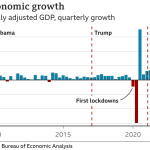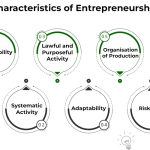Research funding impact plays a crucial role in driving innovation and growth across the U.S. economy. Cuts to essential research grants threaten not only the progress of scientific discovery but also the vibrancy of the startup ecosystem that relies on these advancements. With federal funding fueling breakthroughs in fields like medicine and technology, the potential ramifications of funding reductions could stifle economic growth and cripple our entrepreneurial landscape. As new research indicates, every dollar invested in biomedical research yields substantial returns in economic activity, highlighting the intertwined nature of research funding and entrepreneurship. Thus, nurturing robust research initiatives is not just an academic concern; it is paramount for fostering scientific innovation and ensuring a thriving economy.
The impact of financial support for research is one of the most significant factors influencing technological progress and market advancements. When examining the ecosystem of startups and entrepreneurial ventures, we can see that the relationship between academic institutions and innovation is essential for fostering new business opportunities. This connection underscores the importance of government investment in scientific research, as it lays the groundwork for economic development and a healthy entrepreneurial curriculum. Without adequate funding, aspiring entrepreneurs struggle to translate new discoveries into viable business models, ultimately hampering U.S. economic growth and limiting scientific advancement. Clearly, bolstering research financial support is vital for igniting the creative spark that drives the startup landscape.
The Importance of Research Funding for Economic Growth
Research funding is crucial for the advancement of scientific innovation, which in turn drives economic growth. Federal funding for research institutions like Harvard not only supports high-level scientific inquiry but also spurs the creation of startup companies that turn innovative ideas into marketable products. A vibrant startup ecosystem relies on fresh ideas and breakthroughs often born in university labs. When funding is frozen or cut, as we’ve seen with the recent federal actions, the entire innovation pipeline can become disrupted, leading to significant economic consequences.
Furthermore, new research indicates that each dollar invested in federal biomedical research generates approximately $2.56 in economic activity. This illustrates how critical research funding is not merely as a mechanism for scientific advancement but as a pillar supporting the economy. The potential decline in GDP, projected at 3.8% with even minimal cuts, highlights the stakes involved in maintaining robust funding environments and fostering entrepreneurship and innovation.
Integrating Entrepreneurship Curriculum with Scientific Research
The integration of an entrepreneurship curriculum at research universities is fundamental to nurturing the next generation of innovators. Institutions like Harvard Business School leverage this curriculum to empower students to develop startups, translating academic knowledge into real-world applications. This curriculum does more than teach entrepreneurial theory; it creates an environment where students can access resources, mentorship, and funding opportunities while also engaging with industry leaders.
This hands-on approach cultivates an entrepreneurial mindset among students, allowing them to turn innovative concepts into viable business ventures. By pairing academic rigor with practical application, universities are effectively training future leaders in science and technology who will contribute to the startup ecosystem, further fueling economic growth and scientific development.
The Role of Universities in Incubating Startups
Universities serve as critical incubators for startups in the technology and biomedical sectors. The unique environment fostered within research institutions offers access to cutting-edge resources, faculty expertise, and interdisciplinary collaboration. This ecosystem promotes not just research but the practical application of findings, essential for launching successful startups. Departments such as electrical and mechanical engineering, alongside dedicated labs, provide an incubative atmosphere where innovative ideas can flourish.
Moreover, the presence of technology licensing offices and partnerships with venture capitalists helps guide these embryonic companies toward success. With access to mentorship and funding, academic innovators can transform their research breakthroughs into commercial endeavors, significantly impacting the economy and the broader entrepreneurial landscape.
Federal Funding’s Impact on Scientific Innovation
Federal funding is the bedrock upon which significant scientific innovation is built. Disruptions to this funding create ripples that affect not only ongoing research projects but also the development of future technologies that can shape industries. The halt in funding can stifle groundbreaking developments in fields like biomedicine and renewable energy, where every dollar plays a pivotal role in ensuring progress. Without adequate financial support, researchers may face delays in their work, leading to critical innovations being sidelined.
The broader implications of federal funding cuts extend to national competitiveness, particularly against other nations that heavily invest in research and development. When research funding is limited, the U.S. risks falling behind in the global race for technological advancement, impacting its ability to attract top talent and maintain its status as a leader in innovation.
The Future of Startups Amidst Funding Challenges
As we’re beginning to see the long-term effects of federal funding freezes, questions arise regarding the future of startups emerging from research institutions. The disruption in funding, hiring freezes, and canceled grants may hinder the emergence of new companies that are essential for innovation and economic vitality. Founders often rely on years of prior research and resources available at universities to build their ventures, and with funding at stake, the landscape for new startups may become barren in the short-term.
Moreover, without new sources of funding or intervention to reverse the funding cuts, we may observe a dramatic decline in the volume and quality of startups entering the market over the next few years. This pattern could create a serious gap in the innovation pipeline, stifling the entrepreneurial spirit and leading to a less dynamic economic climate.
The Ripple Effect of Research Funding Cuts
The implications of cutting research funding extend beyond immediate financial concerns; they create a ripple effect throughout the ecosystem of innovation and entrepreneurship. New ventures that typically arise from university settings often take years to incubate and launch, meaning that the effects of current funding freezes may not be felt until 2025 and beyond. As fewer promising startups emerge from university incubators due to funding constraints, the U.S. risks losing its competitive edge in global markets that thrive on innovation.
Additionally, the disruption in funding can lead to increased uncertainty among investors and entrepreneurs within the startup ecosystem. If the landscape appears less favorable due to resource constraints, it can result in a chilling effect on new investments and entrepreneurial activities, ultimately hampering potential contributions to economic growth.
Attracting the Best and Brightest Entrepreneurs
Research universities have a unique ability to attract brilliant minds from around the globe, fostering an environment ripe for innovation and entrepreneurship. However, a lack of federal funding can hinder this process, as aspiring entrepreneurs are drawn to institutions that not only offer robust academic programs but also sufficient financial backing for their research endeavors. This interplay between funding and talent attraction is crucial for sustaining a vibrant startup ecosystem.
When funding is secure, universities can provide enhanced resources and opportunities that motivate talented individuals to innovate and create. Without this support, there is a danger that universities will be unable to sustain their reputation as incubators for bright ideas and successful startups, thus ultimately affecting U.S. economic growth and leadership in science and technology.
Navigating the Challenges of Startup Realities
The challenges facing startups today are multifaceted, ranging from funding shortfalls to regulatory hurdles. Entrepreneurs must navigate these realities while seeking to bring their innovative ideas to market. In a funding-constrained environment, aspiring startup founders often find it increasingly difficult to secure the resources necessary to launch and grow their ventures, resulting in a high level of uncertainty.
Additionally, the rapid pace of technological advancement means that startups must not only contend with financial challenges but also stay ahead of emerging trends. In this context, it becomes imperative for universities and research institutions to provide robust support that addresses these barriers, ensuring that the next generation of entrepreneurs has the tools they need to succeed.
The Interplay of Federal Funding and Startup Viability
The interplay between federal funding and the viability of startups cannot be overstated. Startups, particularly in the realms of technology and biomedical research, rely heavily on a steady stream of funding to translate ideas into operational businesses. When federal funding is unstable or cut, it places immense pressure on these nascent ventures, often leading them to struggle to secure additional private investment.
In many cases, the early-stage capital from government grants acts as a catalyst for attracting further investments. Therefore, a decrease in federal funding can result in a cascade effect, leading to a shortage of funding opportunities that undermines the entire entrepreneurial ecosystem, limiting the pool of innovative startups needed for robust economic growth.
Frequently Asked Questions
What is the impact of research funding on the startup ecosystem?
Research funding plays a crucial role in the startup ecosystem by enabling universities to foster innovation and commercialization of ideas. With adequate funding, research labs can generate new technologies that can be transformed into successful startups, driving economic growth.
How does federal funding contribute to economic growth through scientific innovation?
Federal funding is essential for scientific innovation as it provides resources for labs to explore groundbreaking research, leading to novel products and services. This, in turn, stimulates economic growth by creating jobs and enhancing competitiveness within the global market.
In what ways can research funding affect entrepreneurship curricula in universities?
Research funding can enhance entrepreneurship curricula by providing institutions with the resources to develop comprehensive programs that prepare students to launch startups. This funding supports initiatives like incubation centers and partnerships with venture capitalists, ensuring that students have access to necessary guidance and mentorship.
What are the long-term effects of cuts to research funding on tech startups?
Cuts to research funding can have significant long-term effects on tech startups, leading to fewer new ventures entering the market. Disruptions in funding can halt research initiatives, creating a gap in innovation and delaying the commercialization of potential breakthroughs.
How does the interruption of NIH funding impact scientific research and startups?
The interruption of NIH funding affects scientific research by delaying or canceling essential grants, which can disrupt ongoing projects. Startups that rely on this research for development may struggle, resulting in fewer innovative products entering the marketplace, which ultimately hinders economic growth.
| Key Point | Details |
|---|---|
| Impact of Funding Freeze | Harvard’s funding freeze threatens $2 billion in research grants, affecting innovation and economic growth. |
| Economic Consequences | Projected GDP decline by 3.8% due to potential funding cuts, comparable to Great Recession. |
| Role of Research Universities | Universities serve as incubators for startups, linking faculty research and student entrepreneurship. |
| Long-Term Startup Impact | Disruptions may lead to fewer startups in coming years as lab-generated ideas lag in development. |
| Opportunity for Innovation | Federal funding essential for attracting talent and creating successful commercial ventures. |
| Ripple Effect of Changes | Effects of funding freeze expected to manifest over 1-3 years, impacting new enterprise development. |
Summary
The research funding impact is critical for sustaining innovation and economic growth in the U.S. landscape. As financial resources dwindle, we see immediate threats to the entrepreneurial ecosystem, specifically at research universities known for spawning startups and technological breakthroughs. The potential decline in GDP and significant repercussions on new startup formations highlight the urgency of addressing funding challenges. Without a commitment to restoring and enhancing research funding, the long-term consequences could stifle the very innovations that drive our economy forward.









